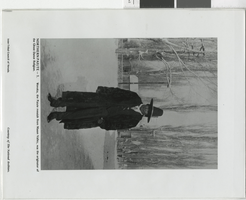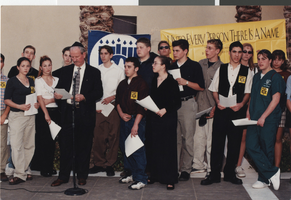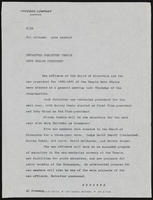Search the Special Collections and Archives Portal
Search Results

Jewish Federation correspondence, meeting minutes, and other records, item 11
Description
Community Relations Committee meeting minutes for the Jewish Federation of Las Vegas, Nevada, February 24, 1988.

Transcript of interview with Mindy Unger-Wadkins by Barbara Tabach, October 28, 2015
Date
Archival Collection
Description
In this interview, Unger-Wadkins discusses growing up in Las Vegas? close-knit Jewish community in the 1960s and 1970s, and involvement with various Jewish youth organizations and activities. She also describes her career in public relations, reflecting upon the unique challenges faced when interacting with the public, and with politics, in her positions. Unger-Wadkins ends by describing her current work in land development, particularly the history of the Three Kids Mine and the technical and political process of ensuring the land is suitable as a residential area.
Text
Midbar Kodesh Temple (Henderson, Nev.)
Midbar Kodesh is a Conservative Jewish temple founded in Henderson, Nevada in 1995 by former members of Temple Beth Sholom. Population growth and physical expansion of real estate warranted the establishment of the second Conservative congregation in Southern Nevada, whose name means “Holy Desert.” Temple Beth Sholom was moving to the west side of the valley, and a group of families- the Kaminskys, Goldmans, Rothmans, Simons, Goldsteins, and Feldmans, decided to start a new temple on the east side.
Corporate Body

Transcript of interview with Michael Tell by Barbara Tabach, January 6, 2018
Date
Archival Collection
Description
Michael Tell, the youngest son of Jack and Beatrice Tell, is the publisher of the Las Vegas Israelite newspaper and the second generation of ownership. He briefly traces his Jewish ancestral roots back to Eastern European grandparents who settled in New Jersey and New York. He became a bar mitzvah in a conservative Jewish synagogue in New York City. At age sixteen, he accompanied his father, Jack Tell, westward to Nevada. The elder Tell was in pursuit of owning a newspaper and Mike was a perfect companion as Jack took over ownership of the Territorial Enterprise. Mike recalls it was a short lived venture and the family settled in Las Vegas, where his father went to work for Hank Greenspun at the Las Vegas Sun and then for Henderson Home News, owned by Morry Zenoff. In 1965, Jack Tell opened the Las Vegas Israelite. Meanwhile, Mike explored the lucrative business of concert promotions and opened a teen nightclub 1961 called the Twin Lakes Twist. He hired such talents of the era as Bobby Darin and Wayne Newton. Soon his business acumen grew and he moved Mike Tell Productions to Los Angeles. He tells the story of his last concert, booking Al Green, and being held at gunpoint. Then in 1979, he returned to work at the Israelite, which had a circulation of about 2000. The Jewish community was beginning to show signs of growth. He recalls running an ad in 1992 for High Holy Days services to be held at the Aladdin hotel. He used the word “Lubavitvh” in the ad and this sparked an interest in Las Vegas from the Chabad movement. He also recalls anti-Semitic episodes in Las Vegas, such as Ralph Englestad’s Hitler birthday parties and the presence of Skinheads. And he reflects on the changes in the community that he has observed over the decades.
Text
Jacque Dvorak oral history interview
Identifier
Abstract
Oral history interview with Jacque Dvorak conducted by Barbara Tabach on March 9, 2017 for the Southern Nevada Jewish Heritage Project. In this interview, Dvorak discusses being a member of Jewish youth organizations at Temple Beth Sholom, early episodes of antisemitism, the opening of MGM Grand, and raising Jewish children in Las Vegas, Nevada.
Archival Collection

Transcript of interview with Rabbi Mel Hecht by Barbara Tabach, March 17, 2016
Date
Archival Collection
Description
In this interview, Hecht talks his life experiences leading him to becoming a rabbi, eventually being a spiritual leader in Las Vegas. He discusses his experiences at Ner Tamid as well as the joy of starting Temple Beth Am, with the support of Morris and Lillian Shenker. Hecht shares stories about working with unions and Ralph Engelstad.
In 1939, Rabbi Mel Hecht was born in Detroit, Michigan. At the age of five, his family moved to Miami, Florida where they had a large, extended Jewish family, complete with relatives who were hazzans and mohels. Soon after moving to Florida, his parents bought a hotel in Hialeah, about 10 miles outside of the city, where Hecht spent the remainder of his childhood. Hecht attended the University of Miami where he earned a Ph.D. in Divinity, and subsequently attended the Hebrew University of Jerusalem. In 1971, he became a rabbi upon graduating from seminary in Cincinnati, Ohio. Three years later, Hecht joined the U.S. Army and served as a race relations officer in Germany. After his service, Hecht returned to Florida (Fort Pierce) to lead his own congregation, and in 1980, he moved to Las Vegas and became the congregational rabbi for Congregation Ner Tamid. Two years later, he left Ner Tamid to start a new congregation?Temple Beth Am?which grew swiftly. In 1982, Hecht also married Michelle (?Micki?). The couple have three children: Melissa Hecht, Karin Toti, and Adam Hecht.
Text

Photograph of Wovoka, early 1900s
Date
Archival Collection
Description
Image

Photographs of Congregation Ner Tamid during Yom Ha' Shoa (Holocaust Remembrance Day), 1999
Date
Archival Collection
Description
Photographs showing groups gathered for Holocaust Remembrance Day, 1999.
Image


